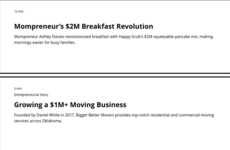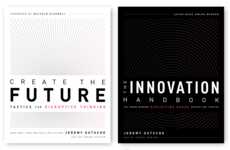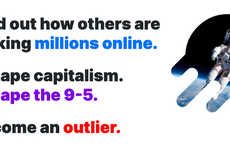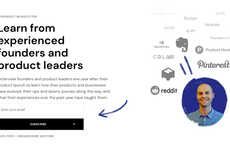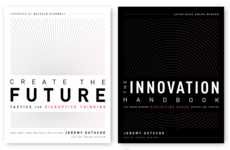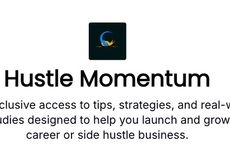
Armida Ascano — October 5, 2011 — About
References: business.financialpost
Though Chief Trend Hunter Jeremy Gutsche is often written about and interviewed, very few publications have provided as intimate a look into his experiences and opinions as Financial Post. The reputable publication interviewed Gutsche for the FP Tech Desk, releasing the in-depth piece to the public yesterday.
Jameson Berkow acts as the reader's guide through Gutsche's mind, delving into such topics as entrepreneurship, money, and of course, success. Step into the mind of a man who left a "cushy" position as the director at a bank for the fickle, frenzied world of social media and entrepreneurship.
Jeremy Gutsche – Founder, Trend Hunter Inc.
By: Jameson Berkow, Financial Post
Industry: Social media
No. of Trend Hunters: 68,692
Turning point: Giving up a cushy job at Capital One in 2006 to concentrate full-time on his new business
FP: You gave up a well-paying job in the financial industry to start Trend Hunter. What made you want to risk striking out on your own?
Gutsche: Dialing back, I guess I was always just an entrepreneur at heart — desperately looking for what my next big idea would be and that started when I was just a kid. Pretty much every decision I made in life, whether it was my university or becoming a management consultant, was all just to really point my brain in the direction of new ideas and I hoped along the way that I would figure out what I wanted to do. But I still hadn’t figured that out after 10 years of consulting and innovation. The biggest challenge in [Trend Hunter’s] beginning was just trying to make that first decision to leave the corporate job. I was a director at a bank and I was getting paid nicely. The problem is you keep on having better pay and a successful role and that makes the idea of becoming an entrepreneur more and more difficult: Why go out and take that risk?
FP: What outside funding or support did you have at the start?
Gutsche: It was all just bootstrapped by myself. The basic model was: come home, do all the work myself until four in the morning and then begin the coding, graphic designing and all that kind of stuff for about a year-and-a-half until I started doing it full-time. By then, Trend Hunter had grown to about one million views per month. It started taking off and that allowed me to really dedicate myself full-time.
FP: Did your initial lack of funding become a limitation in any way?
Gutsche: Funding hasn’t been a requirement for us, although it does mean that we’ve constrained our growth to try to cautiously expand. At the same time, it still was probably the right decision for us, because it forced us to make decisions that are profitable and focus on that business model first, but also to expand at the right pace, bringing people on who are trained and adding value before you add more new people.
FP: It sounds like you consider having been bootstrapped to be a competitive advantage.
Gutsche: We’ve always operated to be profitable whereas other start-ups get venture-capital financing and then burn money away. When you look at start-ups that fail, often you’ll see them hiring people, throwing money at problems without actually forcing themselves to come up with that solution first. There are a lot of other sites out there that have spent millions of dollars trying to get to where they are, and today they’re still burning money whereas we’re not burning money. Instead, we’ve been expanding in the right direction.
FP: Aside from efficient spending and a passion for your work, to what else do you attribute Trend Hunter’s success?
Gutsche: Not becoming complacent with success. As Peter Drucker, probably the most famous management theorist of all time, once said, “It is not the questions that change, it is the answers that do.” You need to constantly be thinking about what it is that you actually provide your consumer. What is the experience? Not just the product. And the more you can challenge yourself and push yourself, the more you’ll end up evolving to current and future trends and the more you’ll
stay relevant.
Jameson Berkow acts as the reader's guide through Gutsche's mind, delving into such topics as entrepreneurship, money, and of course, success. Step into the mind of a man who left a "cushy" position as the director at a bank for the fickle, frenzied world of social media and entrepreneurship.
Read the full article at Financial Post
How I Made It
Jeremy Gutsche – Founder, Trend Hunter Inc.
By: Jameson Berkow, Financial Post
Industry: Social media
No. of Trend Hunters: 68,692
Turning point: Giving up a cushy job at Capital One in 2006 to concentrate full-time on his new business
FP: You gave up a well-paying job in the financial industry to start Trend Hunter. What made you want to risk striking out on your own?
Gutsche: Dialing back, I guess I was always just an entrepreneur at heart — desperately looking for what my next big idea would be and that started when I was just a kid. Pretty much every decision I made in life, whether it was my university or becoming a management consultant, was all just to really point my brain in the direction of new ideas and I hoped along the way that I would figure out what I wanted to do. But I still hadn’t figured that out after 10 years of consulting and innovation. The biggest challenge in [Trend Hunter’s] beginning was just trying to make that first decision to leave the corporate job. I was a director at a bank and I was getting paid nicely. The problem is you keep on having better pay and a successful role and that makes the idea of becoming an entrepreneur more and more difficult: Why go out and take that risk?
FP: What outside funding or support did you have at the start?
Gutsche: It was all just bootstrapped by myself. The basic model was: come home, do all the work myself until four in the morning and then begin the coding, graphic designing and all that kind of stuff for about a year-and-a-half until I started doing it full-time. By then, Trend Hunter had grown to about one million views per month. It started taking off and that allowed me to really dedicate myself full-time.
FP: Did your initial lack of funding become a limitation in any way?
Gutsche: Funding hasn’t been a requirement for us, although it does mean that we’ve constrained our growth to try to cautiously expand. At the same time, it still was probably the right decision for us, because it forced us to make decisions that are profitable and focus on that business model first, but also to expand at the right pace, bringing people on who are trained and adding value before you add more new people.
FP: It sounds like you consider having been bootstrapped to be a competitive advantage.
Gutsche: We’ve always operated to be profitable whereas other start-ups get venture-capital financing and then burn money away. When you look at start-ups that fail, often you’ll see them hiring people, throwing money at problems without actually forcing themselves to come up with that solution first. There are a lot of other sites out there that have spent millions of dollars trying to get to where they are, and today they’re still burning money whereas we’re not burning money. Instead, we’ve been expanding in the right direction.
FP: Aside from efficient spending and a passion for your work, to what else do you attribute Trend Hunter’s success?
Gutsche: Not becoming complacent with success. As Peter Drucker, probably the most famous management theorist of all time, once said, “It is not the questions that change, it is the answers that do.” You need to constantly be thinking about what it is that you actually provide your consumer. What is the experience? Not just the product. And the more you can challenge yourself and push yourself, the more you’ll end up evolving to current and future trends and the more you’ll
stay relevant.
Trend Themes
1. Entrepreneurship - Disruptive innovation opportunities in this trend include developing new business models and finding innovative approaches to solving entrepreneurial challenges.
2. Social Media - Disruptive innovation opportunities in this trend include creating new platforms or tools that enhance the social media user experience and finding innovative ways to monetize social media.
3. Success - Disruptive innovation opportunities in this trend include developing new strategies or methodologies for achieving success, as well as finding innovative ways to measure and define success.
Industry Implications
1. Social Media - Disruptive innovation opportunities in this industry include developing new social media platforms or tools, as well as finding innovative ways to leverage social media for marketing and business growth.
2. Technology - Disruptive innovation opportunities in this industry include creating new technologies or digital solutions that enhance entrepreneurship and drive success.
3. Consulting - Disruptive innovation opportunities in this industry include developing new consulting methodologies or approaches that support the needs of entrepreneurs and help them achieve success.
0.6
Score
Popularity
Activity
Freshness


